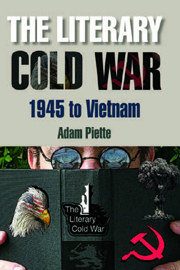Book contents
- Frontmatter
- Contents
- Acknowledgements
- Introduction
- 1 The Special Relationship and the British Hypothesis: The Black Laurel, The Third Man, Cold War Vienna and Berlin
- 2 Cold War on the 1930s and Sacrificial Naming: John Dos Passos and Josephine Herbst
- 3 DEW Line, Uranium and the Arctic Cold War: Ginsberg's Kaddish and Nabokov's Lolita
- 4 Cold War Sex War, Or the Other Being Inside: Burroughs, Paley, Plath, Hughes
- 5 The Sacrificial Logic of the Asian Cold War: Greene's The Quiet American and McCarthy's The Seventeenth Degree
- Conclusion
- Bibliography
- Index
1 - The Special Relationship and the British Hypothesis: The Black Laurel, The Third Man, Cold War Vienna and Berlin
Published online by Cambridge University Press: 12 September 2012
- Frontmatter
- Contents
- Acknowledgements
- Introduction
- 1 The Special Relationship and the British Hypothesis: The Black Laurel, The Third Man, Cold War Vienna and Berlin
- 2 Cold War on the 1930s and Sacrificial Naming: John Dos Passos and Josephine Herbst
- 3 DEW Line, Uranium and the Arctic Cold War: Ginsberg's Kaddish and Nabokov's Lolita
- 4 Cold War Sex War, Or the Other Being Inside: Burroughs, Paley, Plath, Hughes
- 5 The Sacrificial Logic of the Asian Cold War: Greene's The Quiet American and McCarthy's The Seventeenth Degree
- Conclusion
- Bibliography
- Index
Summary
In Storm Jameson's 1947 novel The Black Laurel, set in 1945 Berlin, the American philanthropist Scorel is shown busy in the rubble, cellars and internment camps of the ruined city, offering gifts, medicine and hearty work-ethic advice to the tormented survivors. He sees himself as the good doctor for Europe, vast hospital of invalids, acting with a child's egoism and generosity, a bully but a good man. He is viewed by the English in Berlin with a mixture of politeness, respect and derision for his naivety and ‘unmisgiving ignorance’ (Jameson, The Black Laurel, p. 127). The military view of the man is tinged with ill-concealed contempt for the country he represents: ‘A nation that lets its chiefs of staff run its foreign policy’ (p. 48). Scorel is a minor character in this dense, ambitious novel, yet his status as typical charitable Yank in war-torn Europe ramifies beyond his brief though regular appearances. His doctoring role is keyed in to a network of references to diseased, tortured and dead flesh in the book which trope the city ruins as the flayed ‘body of Europe’ (p. 35). The collapsed streets have suffered internal trauma within that body, predicated as a form of ‘intestinal rupture’ (p. 36).
The topography of the city is not only politically zoned between the four powers, but psychogeographically zoned too: the business of international intrigue, crime, conspiracy and expediency takes place on a precarious surface, floors balanced dangerously above empty space and rubble (p. 68).
- Type
- Chapter
- Information
- The Literary Cold War 1945 to Vietnam , pp. 19 - 46Publisher: Edinburgh University PressPrint publication year: 2009

